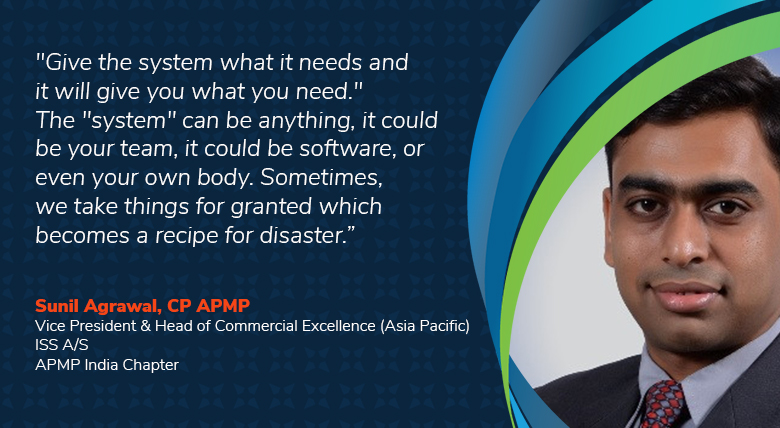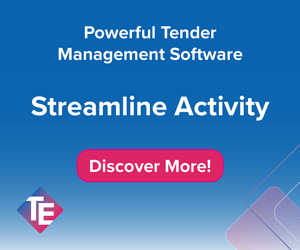With 20 years of successful management and leadership experience, Sunil Agrawal’s successful career spans across both Military and Corporate domains. Within the corporate domain, he has gained experience in four different industries: Defense, Telecom, Information Technology, and Facilities Management.
After transitioning from the military world, Sunil started as a Bid Manager in Thales, then moved to Ericsson as a Team Lead, and soon went on to become the Head of Bid Management. He then moved to ISS A/S with an aim to design and implement a Centre of Excellence for the Pre-Sales function in Asia Pacific. He now heads the Commercial Excellence function which encompasses Bid Management, Price Management, CRM Administration, Graphic Design, and Knowledge Management. As a member of the ISS Asia Pacific Commercial Leadership Team, he supports the development and execution of the regional commercial strategy and governance, associated financial reporting, and commercial model sign-offs.
Sunil is also the Past Chair of APMP India and a member of the Intentional Career Path Committee (ICP) of APMP International. He holds APMP Practitioner certification and was a Blue Ribbon Panel Member for the APMP-BoK. In 2020, he was also recognized as an APMP 40 Under 40.
Tell us about your proudest professional accomplishment.
There are many, but I would specifically like to mention two here. Our recent biggest accomplishment was to win the ‘Stephen P. Shipley Award for Chapter of the Year’. After I took the Chair position for APMP India in Jan 2020, this was something that we started looking up to. With that as a long-term goal, we started driving a lot of initiatives in APMP India to bring the bid and proposal community together and change the face of APMP India. We received a huge response to our initiatives from the APMP India community which eventually led us to winning the most coveted award in APMP.
I always say that, as proposal professionals, our biggest accomplishment should be when we see our “content” in the customer RFP. In line with this, I would like to mention the event, when one of our customers started including our recommended “content” in its RFP document (copyrighted to us, of course), and rolling out the RFPs as per our suggestion. Not only did we gain a huge competitive advantage, but also went on to win these big RFPs. However, not to forget the hard work and sleepless nights, we did prior, in order to reach such a favored position with the customer.
What was the biggest challenge you’ve faced in your career, and how did you overcome it?
Every challenge is an opportunity and I have had many such opportunities in both my military and corporate career. Not sure, if this was my biggest, but I was hired by ISS A/S to conceptualize and establish the Centre of Excellence for Commercial function in 2017. Bid Management, Price Management, and other such presales functions were almost unknown to ISS at that time and it took a lot of calls, presentations, proof-points, and hard work to make people understand the importance of these functions. However, we were able to establish the CoE, and am proud to say it is one of the most valued departments in ISS A/S.
In your opinion, what is the most important trait needed for someone to be successful in the industry?
I believe the ability to learn is the most important trait needed to be successful in the industry. We should be able to learn quickly, while also unlearning some of our past learnings, as the industry is dynamic and our past learnings get obsolete quickly.
What advice would you give to someone new to the industry?
Read the RFP thoroughly to be in control of your proposal. Don’t assume this to be the responsibility of your subject matter experts. Understand the customer’s intent, needs, and pain points and empathize with your customer while writing proposals. Ask “So What” for every statement you write! Finally, “Own” your proposals. Don’t leave it for someone else to win it for you.
What’s the best advice you’ve received regarding your career or working in the industry?
“Give the system what it needs and it will give you what you need.” The “system” can be anything, it could be your team, it could be software, or even your own body. Sometimes, we take things for granted which becomes a recipe for disaster.” Let’s take a simple example, if we don’t give our body the amount of sleep it needs, will it function to its full potential? Similarly, if you don’t give your team what they need, i.e. recognition, independence, guidance, and the right set of tools, will they be able to achieve the outcome that you desire from them?
How important is professional development/education to the advancement of your career?
Extremely important! As I said earlier, the industry is very dynamic and in order to keep pace with it, we need to keep learning, educating, and developing ourselves to avoid getting redundant/obsolete.
Why is membership in APMP important to you, and how has it helped you advance your organization and career?
APMP membership gives you a sense of belongingness, which is lacking in our profession. Our profession is very diverse and forms part of different departments in different industries/companies. For example, in some companies Bid & Proposal Management is part of the Project/Operations department, while in most it is part of the Sales and Marketing department. Besides, it is not a mainstream profession like Sales, Finance, Human Resources, etc. Hence, it is very likely for the proposal professionals, who are very hard working but not thanked and credited enough, to lose their motivation. APMP membership helps proposal professionals get the required recognition, motivation, and sense of belongingness. It is only because of APMP membership, that I have reached this position. I have always applied the learnings that I get through the APMP network, which have proven to be immensely useful for my career.
What do you do for fun when you aren’t working?
I love spending time with my family. We go on long walks, runs, treks, or short tours when we aren’t working.



Join the Conversation